This is the second article in a two-part series on religiosity and community intolerance. The first article addressed religiosity and intolerance toward gays and lesbians.
WASHINGTON, D.C. -- Gallup Polls conducted in 139 countries between 2006 and 2008 reveal that in countries where a higher percentage of citizens say religion is important in their daily lives people are also more likely to say that their communities are not good places for ethnic or racial minorities to live. However, this trend is not linear. Countries with average levels of religiosity -- comparatively speaking -- report about as much intolerance as the world's most religious countries.
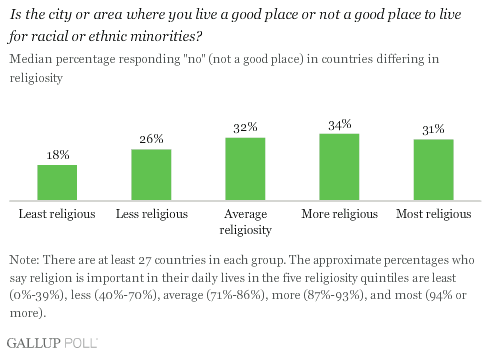
"Religious" people in this analysis are defined as those who report that religion is important in their daily lives. Using the percentage of "religious" people in a given country, all 139 countries are divided into five groups, ranging from least to most religious.
While this measure of religiosity is significantly related to the average GDP in a country -- meaning the richer a country is, the less likely its residents are to say religion is important in their lives -- the link between religiosity and ethnic and racial intolerance exists beyond the differences that can be explained by national income.
Comparing Different Religious Groups
In addition to differences in perceived ethnic and racial intolerance based on a nation's level of religiosity, there are substantial differences in perceived intolerance among self-identified adherents of the world's major faith traditions. Hindus are the least likely to say their communities are not good places for racial and ethnic minorities, while Jews are the most likely to say so.
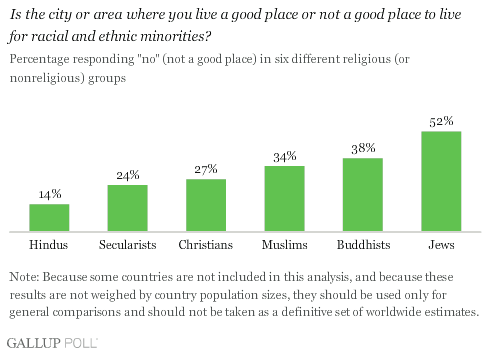
Despite the history of caste systems in some predominantly Hindu cultures, the Hindu American Foundation states, "While tolerance and pluralism are valued by many religions, these concepts are the very essence of Hinduism," and Gallup's findings suggest Hindus are generally true to their creed. It is also important to note that many Hindus do not consider caste to have much to do with race or ethnicity.
After Hindus, Christians are the religious group that reports the lowest level of ethnic intolerance in their communities. In fact, Christians report only slightly more ethnic and racial intolerance than do secularists. In contrast, those in other major faith traditions -- Muslims, Buddhists, and Jews -- are substantially more likely than are secularists to say that the places where they live are not good places for ethnic and racial minorities. Jews are more than twice as likely as secularists to report that their communities are not good places for ethnic and racial minorities.
Local Frictions Have Big Effects
To a great degree, differences among different faith traditions may have more to do with culture than with faith. That is, these group differences may reflect historical and political factors, such as long-standing conflict over territory, rather than religious ideology per se. A case in point involves Jews and Muslims living inside and outside Israel. A majority of Jews and nearly half of Muslims living in Israel say their neighborhoods are not good places for ethnic and racial minorities. Outside of Israel, however, only about one in three Muslims and about one in five Jews say the same thing.
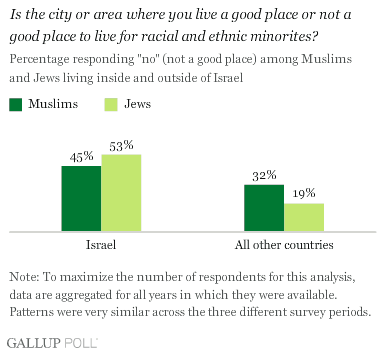
Ethnic and Racial Intolerance and Individual Levels of Religiosity
It is also informative to look within each major faith tradition to compare those who do and do not say that religion is important in their daily lives. In most faith traditions, religious and less religious people report similar levels of intolerance.
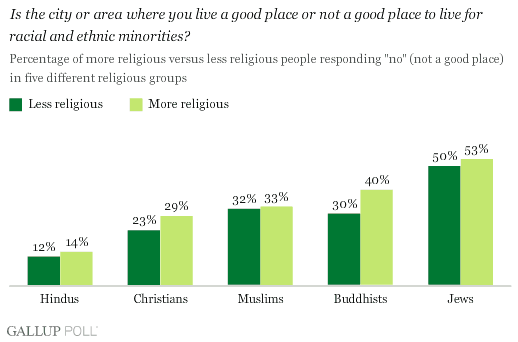
The largest gap, at 10 percentage points, is among Buddhists. However, this difference is driven predominantly by the reports of Buddhists in only a few countries, most notably Vietnam and South Korea. In Japan and Cambodia, for example, it is less religious Buddhists who report more community intolerance. In short, this small average difference, even for Buddhists, varies widely across countries.
Why, then, is there a persistent belief among many that religiosity is associated with ethnic intolerance? Perhaps it's partly because there are specific religious sects in which this is more likely to be the case. For example, Gallup Polls taken in 26 countries (mostly in Eastern Europe and the Former Soviet Union) asked respondents to say whether they thought of their religion as "the one true religion in the world," "one of a few true religions in the world," or "just one way, among many different religions." Among Christians and Muslims, those who say that their religion is the one true religion are the most likely to say their communities are not good for ethnic and racial minorities. In some cases then, exclusionary views of religion are accompanied by exclusionary views of race and ethnicity.
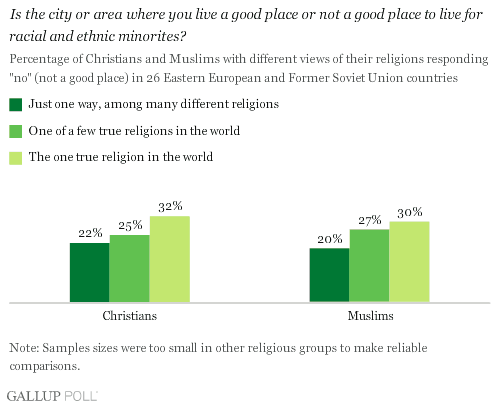
A Caveat: Individual Intolerance or Awareness of Discrimination?
It is a well-worn truism in research on discrimination and ethnic and racial intolerance that the answers one gets in a survey depend greatly on the precise questions one asks. This analysis focuses on a question that essentially asks people to serve as informants about their communities at large. Gallup might have observed different results if it had asked people, for instance, if they would prefer to have a member of a specific minority group as a neighbor.
A Glass of Intolerance: Mostly Empty?
Critics of religion have often noted that religion has historically played a major role in fueling and maintaining ethnic tensions. From the Crusades of the Middle Ages to the ancient tensions that flare daily in the Middle East, religion is certainly connected in some ways to ethnic tensions. This fact notwithstanding, the present findings suggest that most modern religious traditions seem to have made some progress, at least since the Middle Ages, in promoting ethnic understanding and cooperation. Although there are some connections between religiosity and ethnic and racial intolerance, these connections were generally small and inconsistent -- and certainly much smaller than the comparable effects that exist for religious intolerance of gays and lesbians.
Survey Methods
Results are based on telephone and face-to-face interviews conducted between 2006 and 2008 with about 1,000 adults in most countries (and a sample size range of 446 to 2,006). Confidence intervals vary widely based on the sample sizes of specific groups. However, for the results involving groups of countries that vary in religiosity level, confidence intervals were always less than +1 percentage points. In addition to sampling error, question wording and practical difficulties in conducting surveys can introduce error or bias into the findings of public opinion polls.
